High-Ranking Universities That Hold Separate Graduation Events for African Americans
An informal survey by JBHE has found that at least 10 of the nation’s 30 highest-ranked universities hold some form of separate graduation ceremony for African Americans who have completed their degree programs.
For example, at Stanford University about 200 black students who have completed their undergraduate, graduate, or professional degree program attend a special ceremony in the Stanford Memorial Church with their families on the night before the regular university graduation. Family members join the graduate on stage and place a kente cloth around the shoulders of the graduate when his or her name is called. The Stanford black graduation ceremony has been conducted for more than 30 years.
Other high-ranking universities that hold special commencement events for black graduates include Northwestern University, the University of California at Berkeley, the University of Notre Dame, the University of Michigan, the University of Pennsylvania, the University of Virginia, Vanderbilt University, Washington University, and the University of Southern California.

  |
“The critical mass of our African-American students is eroding, and we know the quality of our education experience is absolutely affected, as well as our obligation to the citizens of this state.”
— Janina Montero, vice chancellor for student affairs at the University of California at Los Angeles, commenting on the fact that the number of blacks in this fall’s entering class is the lowest since 1973, in the Los Angeles Times, June 3, 2006
|
Great News on Black Graduate School Enrollments
Some of the most positive news we have reported is that black enrollments in graduate school have continued to grow at a rapid pace. Increased black enrollments and graduate degree attainments are a modest but significant sign of progress in the higher education of African Americans.
In 2004 there were 220,000 blacks enrolled in U.S. graduate schools. This was up 8 percent from 2003. Black enrollments in graduate school are up nearly 40 percent since the year 2000. Since 1980 black enrollments in graduate education have tripled.
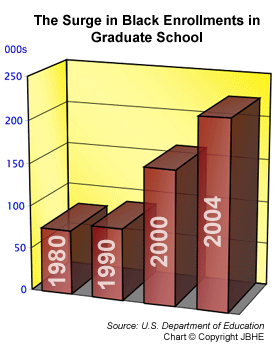

States Making the Most Progress in Increasing African-American College Student Enrollments
In 1999 blacks made up 33.4 percent of all students enrolled in higher education in Mississippi. In 2004 the black percentage of all student enrollments in Mississippi had jumped to 38.4 percent. This five-percentage point rise in black enrollments in the 1999-2004 period was the largest increase of black enrollments of any state.
Other states that showed the largest percentage point gains were Georgia, Arizona, Tennessee, Alabama, Delaware, Florida, and Louisiana.
During the 1999-2004 period, 47 of the 50 states showed gains in the black percentage of total enrollments in higher education. Only in Alaska and Hawaii did the black percentage of all enrollments decline. In Montana the black percentage of all college enrollments stayed the same at a very low 0.6 percent.
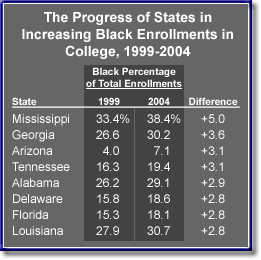

Washington State University Foundation

Senior Vice President and Campaign Director (Official university title: Associate Vice President)
Pullman, Washington
The Washington State University Foundation, an independent, 501(c)(3) organization dedicated to maximizing private sector support for Washington State University, seeks a senior vice president and campaign director to play a central role in leading the organization through a period of unprecedented growth. This person will report to, and partner with, the WSU Foundation president/vice president for university development and work closely with the university’s president and senior academic and administrative leadership. The senior vice president will help lead the most ambitious campaign in the university’s history and will be responsible for directing the operations of a 125+ employee organization.
While the WSU Foundation is an independent organization governed by its own board, it enjoys a close relationship with the university and its board of regents. University leadership is committed to significant investment in the enterprise of fundraising in anticipation of WSU’s second campaign, scheduled to begin in 2007.
Washington State University, ranked by the Carnegie Foundation as one of 95 public and private research institutions nationwide with very high research activity, is one of the nation’s premiere land-grant universities. A member of the Pac-10 Conference, the university boasts nearly 150,000 loyal alumni and enjoys one of the highest alumni participation rates in the nation. The primary campus is located in Pullman, Washington, with a uniquely beautiful landscape and a diverse university community offering an outstanding quality of life including all the cultural, athletic, social, recreational, and intellectual resources associated with this world-class institution and the Pacific Northwest.
The senior vice president and campaign director will be a development professional of proven skill and experience with outstanding leadership and management ability. She or he must think and act strategically and will inspire, motivate, and empower the Foundation’s staff and volunteers to advance the institution with innovative, state-of-the-art techniques and operations. The successful candidate for the senior vice president will possess integrity, professional credibility as a successful major/principal gift fundraiser, outstanding interpersonal and written/verbal communications skills, and a thorough, first-hand knowledge of best practices at like organizations.
Minimum Qualifications: Master’s degree in a related field and a minimum of 8 years related professional experience in a complex organization, with preference given to experience in a higher education setting. Any combination of relevant education and experience may be substituted for the educational requirement on a year-for-year basis. Position requires a valid driver’s license, ability to travel, and work weekends and evenings.
Nominations, expressions of interest, requests for the complete position specification, and applications (including a cover letter and resume) should be submitted via email to WSUVP@wittkieffer.com. Application review will begin June 30. Material that cannot be emailed may be sent to:
Senior Vice President and Campaign Director
Washington State University
c/o Witt/Kieffer
Attention: Dennis M. Barden/John R. Barstad
2015 Spring Road, Suite 510
Oak Brook, IL 60523
Confidential inquiries and questions concerning this search may be directed to Dennis M. Barden at 630/575-6167 or to John R. Barstad at 630/575-6195.
Washington State University is an Equal Opportunity/Affirmative Action educator and employer.
Oregon State University Researchers Find That a Black-Sounding Name Is a Huge Disadvantage When Seeking Rental Housing
 A study by researchers at Oregon State University published in the Journal of Applied Social Psychology finds that an ethnic-sounding name can have an adverse impact on whether a prospective tenant is able to rent an apartment. The researchers sent more than 1,000 e-mails to landlords in the Los Angeles area inquiring about advertised vacancies. The researchers used three different names with ethnic connotations in their inquiries: Patrick McDougall, Tyrell Jackson, and Said Al-Rahman. A study by researchers at Oregon State University published in the Journal of Applied Social Psychology finds that an ethnic-sounding name can have an adverse impact on whether a prospective tenant is able to rent an apartment. The researchers sent more than 1,000 e-mails to landlords in the Los Angeles area inquiring about advertised vacancies. The researchers used three different names with ethnic connotations in their inquiries: Patrick McDougall, Tyrell Jackson, and Said Al-Rahman.
The results showed that Patrick McDougall, presumably a white man, received positive responses from 89 percent of the landlords. Said Al-Rahman received responses encouraging him to apply to rent from 66 percent of the landlords. But when the name Tyrell Jackson was used, positive responses were received from only 56 percent of the landlords.
In the past, similar results have been reported when names with ethnic connotations have been tested in applications for loans and employment.

New Endowed Chair at Morehouse
 Comedian, actor, author, and proponent of higher education Bill Cosby and his wife Camille have donated $3 million for the establishment of the Poussaint-Satcher-Cosby Chair. The chair will honor former surgeon general David Satcher and Alvin Poussaint, professor of psychiatry at Harvard Medical School. Poussaint was a script consultant on the long-running television sit-com, The Cosby Show. Comedian, actor, author, and proponent of higher education Bill Cosby and his wife Camille have donated $3 million for the establishment of the Poussaint-Satcher-Cosby Chair. The chair will honor former surgeon general David Satcher and Alvin Poussaint, professor of psychiatry at Harvard Medical School. Poussaint was a script consultant on the long-running television sit-com, The Cosby Show.
The endowed chair will be the first component in the Satcher Health Leadership Institute at Morehouse School of Medicine which will focus on mental health issues. Satcher will be the first holder of the chair.

New Admissions Requirements at the University of Nevada May Exclude Large Numbers of Blacks
 The board of regents of the University of Nevada voted to make it much more difficult to gain admittance to the institution’s two campuses in Reno and Las Vegas. Beginning in 2008, students will be required to have had a 3.0 grade point average in high school in order to qualify for admission to the university. At the present time, a grade point average of 2.75 is required. The board of regents of the University of Nevada voted to make it much more difficult to gain admittance to the institution’s two campuses in Reno and Las Vegas. Beginning in 2008, students will be required to have had a 3.0 grade point average in high school in order to qualify for admission to the university. At the present time, a grade point average of 2.75 is required.
The American Civil Liberties Union of Nevada declared at the regents meeting that the new standard would prohibit 30 percent of current black applicants from qualifying for admission. The board ordered a research study to determine what effect the new standards would have on blacks and other minorities. The starting date of the new requirements may be pushed back if it is determined that there would be a major negative impact on minority enrollments.
In addition, the board voted to permit 10 percent of the incoming class to be admitted without meeting the 3.0 grade point average requirement. These students could be admitted if they demonstrated leadership, the ability to overcome hardship, or had talents in the arts or athletics.
At the current time, blacks make up 8.2 percent of the total enrollments at the University of Nevada at Las Vegas and 2.3 percent of the enrollment at the University of Nevada at Reno.

A College Diploma Does Not Erase All the Problems Faced by Black Men
Readers of JBHE are well aware of the large and growing higher education gap between black men and black women in this country. For example, black women now earn about 70 percent of all master’s degrees earned by African Americans.
 A new poll conducted by The Washington Post, the Henry J. Kaiser Family Foundation, and Harvard University finds that even for those men who are college graduates, serious problems remain. Thirty percent of all black men with a college degree and an income of more than $75,000 say that they have been physically threatened or attacked because of their race. Nearly two thirds of educated black men with high incomes say they have been unfairly stopped by police. Sixty percent of these college-educated black men say they had a close friend or relative who was murdered, and 60 percent said a close friend or family member served time in prison. A new poll conducted by The Washington Post, the Henry J. Kaiser Family Foundation, and Harvard University finds that even for those men who are college graduates, serious problems remain. Thirty percent of all black men with a college degree and an income of more than $75,000 say that they have been physically threatened or attacked because of their race. Nearly two thirds of educated black men with high incomes say they have been unfairly stopped by police. Sixty percent of these college-educated black men say they had a close friend or relative who was murdered, and 60 percent said a close friend or family member served time in prison.
According to the survey, 60 percent of all adult black men say that their collective problems are due more to their own shortcomings than from anything that “white people have done to blacks.” Despite the problems facing black men, more than three quarters of African-American males say they are satisfied with their lives and 60 percent report that it is a “good time” to be a black man in America.

 Appointments Appointments
• Debra L. Lee, chief executive officer of BET Networks, was named to the board of the Corporation of Brown University. Lee is a 1976 graduate of Brown and went on to earn master’s and law degrees at Harvard University.
 • Mesia Moore Steed was named the first Minority Outreach Fellow of the American Physiological Society. In this position, Steed will travel the country visiting high schools in an effort to encourage black and other minority students to consider careers in biomedical research. Steed, a native of Henderson, Kentucky, is currently in the doctoral program of physiology and biophysics at the University of Louisville. • Mesia Moore Steed was named the first Minority Outreach Fellow of the American Physiological Society. In this position, Steed will travel the country visiting high schools in an effort to encourage black and other minority students to consider careers in biomedical research. Steed, a native of Henderson, Kentucky, is currently in the doctoral program of physiology and biophysics at the University of Louisville.
 • Katrina Bell McDonald, an associate professor of sociology at Johns Hopkins University, was awarded tenure. Professor McDonald is only the second African-American woman to have achieved tenure in the school of arts and sciences at Johns Hopkins. • Katrina Bell McDonald, an associate professor of sociology at Johns Hopkins University, was awarded tenure. Professor McDonald is only the second African-American woman to have achieved tenure in the school of arts and sciences at Johns Hopkins.
Professor McDonald is a graduate of Mills College in Oakland, California. She holds master’s degrees from Stanford University and the University of California at Davis. In 1995 she earned a Ph.D. in sociology from the University of California at Davis with a dissertation entitled “Sister-Friends: Re-Creating Maternal Support in the African-American Community.”
 • Taris E. Mullins was named coordinator of outreach and community services in the Office of Alumni Relations at Virginia Tech. He was the executive director of the diversity advisory board at George Mason University. • Taris E. Mullins was named coordinator of outreach and community services in the Office of Alumni Relations at Virginia Tech. He was the executive director of the diversity advisory board at George Mason University.
Mullins is a graduate of West Virginia University and holds a master’s degree from Coppin State University in Baltimore. He is currently working toward his doctorate from International Seminary in Plymouth, Florida. His dissertation is entitled “Spiritual Warfare: Marriage and Family Counseling.”
 • Jessica M. Bailey was appointed dean of the School of Business and Economics at Winston-Salem State University. She was the dean of the Sydney Lewis School of Business at Virginia Union University in Richmond. • Jessica M. Bailey was appointed dean of the School of Business and Economics at Winston-Salem State University. She was the dean of the Sydney Lewis School of Business at Virginia Union University in Richmond.
A graduate of Coppin State University in Baltimore, Bailey holds a master’s degree in education from Coppin State and an MBA and Ph.D. in marketing from the University of Missouri.

|
House Votes to Increase the Maximum Pell Grant Award and to Restore Educational Programs the Bush Administration Sought to Eliminate
The good news is that for the first time in five years the U.S. Congress appears willing to increase the maximum Pell Grant award. The House Appropriations Committee voted to increase the maximum Pell Grant award to $4,150.
The bad news is that this increase in Pell Grant awards amounts to an insignificant $100. Thus, in an election year, the GOP Congress is offering a token increase in an effort to woo low-income and minority voters or perhaps to deflect charges that it is not concerned with educational issues.
More important was the committee’s decision to spare some popular education programs that the Bush administration had proposed to eliminate. Some of the programs the Congress restored to the budget, which disproportionately benefit blacks, were the Upward Bound and Talent Search programs for low-income students and Gear-Up, a program for disadvantaged middle school students.
The committee, however, voted to eliminate the Thurgood Marshall Legal Educational Opportunity Program, a tutoring program for minority and low-income students who aspire to go to law school.

States That Offer More Merit-Based Financial Aid Than Need-Based Awards
 Last week JBHE reported that financial aid to college students from the governments of the 50 states is increasingly being allocated on the basis of merit rather than need. Because college-bound black students frequently have lower high school grade point averages and score lower on standardized tests for college admission, blacks are placed at a severe disadvantage when competing for these merit-based scholarships. Last week JBHE reported that financial aid to college students from the governments of the 50 states is increasingly being allocated on the basis of merit rather than need. Because college-bound black students frequently have lower high school grade point averages and score lower on standardized tests for college admission, blacks are placed at a severe disadvantage when competing for these merit-based scholarships.
There are wide differences among the states in their allocation of financial aid for college students. In 2005 Utah, Rhode Island, and Wyoming were the only states where all their financial aid was based on need. These three states offer no scholarship aid based solely on merit. Five years ago, there were 14 states that offered only need-based aid.
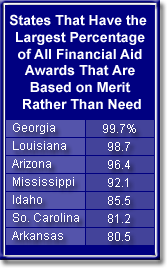 In some states the changeover from need-based aid to merit-based awards has been dramatic. For example, in 2005, after a new state lottery was instituted which funded college scholarships for all students meeting minimum state academic standards, the percentage of all aid in the state of Tennessee based on need dropped to 27.1 percent. In 2004 the percentage was 96.5 percent. In some states the changeover from need-based aid to merit-based awards has been dramatic. For example, in 2005, after a new state lottery was instituted which funded college scholarships for all students meeting minimum state academic standards, the percentage of all aid in the state of Tennessee based on need dropped to 27.1 percent. In 2004 the percentage was 96.5 percent.
In 2005, 20 states — up from 12 in 2004 — offered more merit-based aid than need-based aid to undergraduate students. This is serious because many of these states are in the South where there are large numbers of low-income black students who need financial assistance in order to bear the costs of a college education.

The Gender Gap at the Black Colleges
As is the case in virtually all areas of higher education, black women are increasing their share of total enrollments at the nation’s historically black colleges and universities.
In 1980 women accounted for 54.1 percent of all enrollments at black colleges. By 1990 women were 59.1 percent of all black college enrollments. In 2003 women were nearly 62 percent of the total enrollments at the black colleges.
When we consider African Americans only, we find that since 1980 black women have increased their enrollments at the black colleges by 44 percent. For black men, total enrollments at the black colleges have increased by 17 percent.
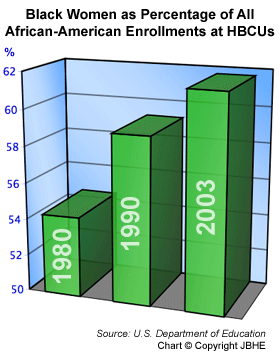

Students From Caribbean Nations at U.S. Colleges and Universities
In the 2004-05 academic year, there were 13,898 students from Caribbean nations attending college in the U.S. These Caribbean students made up 2.5 percent of all foreign enrollments at U.S. colleges and universities in 2005.
Undoubtedly, most of these students from the Caribbean are black. In 2005 Jamaica sent more than 4,300 college students to study in the United States. Nearly 3,000 students from Trinidad and Tobago and more than 1,600 students from the Bahamas attended colleges and universities in the U.S. Haiti sent more than 1,000 students to study at U.S. universities.

Congressional Budget Crunchers Look to Curtail D.C. Tuition Assistance Program Which Has Enabled Thousands of African Americans to Go to College
 This past academic year about 5,000 students who live in the District of Columbia used government funds to attend colleges and universities in 45 different states. Under the tuition assistance program, students who live in Washington, a city that is 60 percent black, can attend publicly operated universities in any state and pay what students who live in those states pay, with the federal government making up the difference. Also, under the plan, students who live in the District can get $2,500 in tuition assistance to attend any private college or university in Virginia or Maryland or any private historically black college in the nation. This past academic year about 5,000 students who live in the District of Columbia used government funds to attend colleges and universities in 45 different states. Under the tuition assistance program, students who live in Washington, a city that is 60 percent black, can attend publicly operated universities in any state and pay what students who live in those states pay, with the federal government making up the difference. Also, under the plan, students who live in the District can get $2,500 in tuition assistance to attend any private college or university in Virginia or Maryland or any private historically black college in the nation.
The grants are available to students who have resided in the District of Columbia for the previous year and are under the age of 25. The grants are available to all students regardless of family income.
The number of students taking advantage of the program has more than doubled over the past five years. But now the tuition program may become a victim of its own success. Congress must reauthorize the grants by the end of 2007, and some GOP legislators are balking at the escalating costs of the program due to increased participation levels. In 2005 the program cost taxpayers more than $33 million.
GOP Senator George Voinovich of Ohio has submitted legislation which would extend the program for five more years but freeze spending at current levels. But critics of the plan, including Eleanor Holmes Norton, the District of Columbia delegate to the House of Representatives, say that freezing the budget would necessitate instituting eligibility requirements or reducing the amount of money for each recipient.

  |
64.3% Percentage of all 25- to 29-year-old white Americans in 2005 who had completed some college work.
49.0% Percentage of all 25- to 29-year-old African Americans in 2005 who had completed some college work.
source: U.S. Department of Education
|
Virginia State University Substitutes Scholarship Grants in Place of Student Loans
Several years ago the University of Virginia launched its AccessUVA financial aid program which substituted scholarship grants in place of loans for students from low-income families.
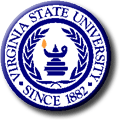 Virginia State University, the historically black state-operated educational institution in Petersburg, does not have the resources of the University of Virginia. In addition, its students are more likely than those at UVA to come from low-income families and, therefore, a greater percentage of its students require financial aid assistance. Nevertheless, Virginia State is also seeking to ease the debt burden of its students. The university’s Low Income Families With Talented Students (LIFTS) program will provide 75 percent of a student’s financial aid needs with outright grants. A maximum of 25 percent of all financial aid will be in the form of loans. The program will apply for both in-state and out-of-state students. Virginia State University, the historically black state-operated educational institution in Petersburg, does not have the resources of the University of Virginia. In addition, its students are more likely than those at UVA to come from low-income families and, therefore, a greater percentage of its students require financial aid assistance. Nevertheless, Virginia State is also seeking to ease the debt burden of its students. The university’s Low Income Families With Talented Students (LIFTS) program will provide 75 percent of a student’s financial aid needs with outright grants. A maximum of 25 percent of all financial aid will be in the form of loans. The program will apply for both in-state and out-of-state students.
Virginia State estimated that the new program will add about $700,000 per year to its financial aid costs.

New Harvard Report on Faculty Diversity Sheds No New Light on the Progress of Blacks
 Evelynn Hammonds, senior vice provost for faculty development and diversity at Harvard University, has issued her office’s first annual report on efforts to increase gender and racial diversity on the university’s faculty. Evelynn Hammonds, senior vice provost for faculty development and diversity at Harvard University, has issued her office’s first annual report on efforts to increase gender and racial diversity on the university’s faculty.
The report found that in Harvard’s Faculty of Arts and Sciences, which includes Harvard College, 10 percent of the tenured faculty and 17 percent of the tenure-track faculty are members of minority groups. But nowhere in the report is there a racial breakdown of minority faculty. Therefore, we don’t know from these statistics if blacks are being hired to the Harvard faculty or if the university faculty is increasingly made up of scholars of Asian descent.
The latest JBHE survey of black faculty at the nation’s highest-ranked universities found that blacks were 3.1 percent of the total full-time faculty, which placed Harvard seventh among the eight Ivy League universities.

California State University, Fresno
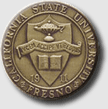
Human Resources Director
Seeking an energetic, visionary and customer-focused human resources professional. Successful candidates will have a broad range of human resources experience, policy development and implementation of strategic HR initiatives. The position provides senior leadership and overall management and delivery of human resource programs and services to the campus community.
Please visit our web site at http://www.csufresno.edu/humres/Jobs/dirhr/ for a full position description and related details. Application packages must be received by July 14, 2006 for full consideration.
EOE
In Memoriam
William Wallace (1944-2006)
Bill Wallace, former associate dean for academic student affairs and executive director of urban health programs at the University of Illinois College of Medicine in Chicago, died late last month from kidney failure. He was 62 years old.
A native of Brooklyn, Wallace graduated summa cum laude from Howard University and went on to earn master’s degrees from New York Medical College and Harvard University. He later earned a Ph.D. in microbiology from Harvard. Wallace then worked as a senior adviser at Harvard and developed the university’s Health Careers Summer Program which sought to bring more black and minority students into the healthcare field.
Wallace then accepted a position as assistant dean for student affairs at the University of Pittsburgh School of Medicine. At Pitt he confronted the administration about the lack of minority students at the medical school. He was told that there were few qualified minority applicants. Wallace then reviewed the files of 102 minority students who were denied admission. He discovered that 100 of the 102 had been admitted to other medical schools of comparable ranking. From that time on, black enrollments at the University of Pittsburgh medical school began to climb.
From 1981 to 1995, Wallace served as an administrator at the University of Illinois College of Medicine.
Robin M. Williams Jr. (1914-2006)
 Robin M. Williams Jr., one of the nation’s leading sociology scholars, has died in Irvine, California, at age 91. Williams, a white man, was a leading scholar on race. Robin M. Williams Jr., one of the nation’s leading sociology scholars, has died in Irvine, California, at age 91. Williams, a white man, was a leading scholar on race.
Williams’ work on racial segregation in public schools was used by Thurgood Marshall in his arguments in the Brown v. Board of Education case. Williams’ 1964 book, Strangers Next Door was the culmination of eight years of research on white attitudes toward Negroes. He later was the co-editor of the critically acclaimed book A Common Destiny: Blacks and American Society and co-chaired the national Research Council’s Committee on the Status of Black Americans.
Williams was the son of a North Carolina farmer and earned his bachelor’s degree at North Carolina State University. He later earned a master’s and Ph.D. at Harvard. He was a professor of sociology at Cornell University for 56 years before leaving to take on the assignment of building a sociology department at the University of California at Irvine. In 2003 Williams published his final book at the age of 89.

Award
• Gerald Talbot, the first African American to win a seat in the Maine state legislature, had the auditorium in Luther Bonney Hall on the campus of the University of Southern Maine named in his honor. Talbot never attended college. But in 1995 he donated his collection of memorabilia and documents concerning the history of blacks in Maine to the university. 
Grants
• Howard University was awarded a three-year, $150,000 grant from the Susan G. Komen Breast Cancer Foundation for a postdoctoral fellowship to train a black or other minority scientist in breast cancer research.
• Hampton University received computer software valued at $58 million from UGS Corporation of Plano, Texas. The software includes product lifecycle management programs for students in Hampton’s School of Engineering and Technology.

|



